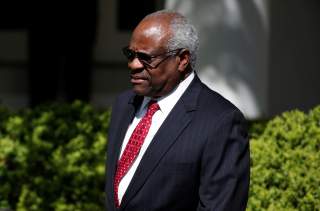We Watched the New Clarence Thomas Documentary. It's Not Good for Biden.
The justice is not kind about Biden's time on the Senate Judiciary Committee.
- Justice Clarence Thomas criticizes former Vice President Joe Biden’s stewardship of the Senate Judiciary Committee in a forthcoming documentary about his life called “Created Equal: Clarence Thomas In His Own Words.”
- Biden, who chaired the Judiciary Committee during Thomas’s 1991 confirmation hearing, has since elicited almost universal condemnation for his treatment of Thomas and Anita Hill, a law professor who accused the justice of sexual misconduct.
- The documentary premiers in theaters on Jan. 31.
Supreme Court Justice Clarence Thomas criticizes former Vice President Joe Biden’s stewardship of his 1991 confirmation hearings in a forthcoming documentary from Manifold Productions called “Created Equal: Clarence Thomas In His Own Words.”
At one juncture of the film, Thomas was asked about a colloquy with Biden over natural law philosophy and the Constitution. Though he did not cite Biden by name, Thomas lamented that lawmakers do not seem to have full command of the subject matter during judicial confirmation hearings.
“One of the things you do in hearings is you have to sit there and look attentively at people you know have no idea what they’re talking about,” Thomas said of the hearings.
“I have to be perfectly honest with you — you sit there, and you have no idea what they are talking about,” Thomas said elsewhere.
Thomas said Biden’s questions about natural law jurisprudence were little more than a ruse to draw him into a debate about abortion. The justice was famously circumspect about the subject during his confirmation hearings, at what one point claiming he had never even discussed the 1973 Roe v. Wade decision as a law student.
The Daily Caller News Foundation viewed the documentary at an advanced screening. Biden chaired the Senate Judiciary Committee when former President George H.W. Bush nominated Thomas for the high court. The Biden campaign did not respond to the DCNF’s requests for comment.
The film also recounts the racist attacks that accompanied Thomas’s nomination. Former Senate Majority Leader George Mitchell, a Democrat, said Thomas’s nomination suggested Bush was “against quotas for every position except the Supreme Court.”
“I felt as though in my life I had been looking at the wrong people as the people who would be problematic toward me,” Thomas said of such statements. “We were told that ‘Oh it’s going to be the bigot in the pickup truck. It’s going be the Klansman. It’s going to be the rural sheriff.'”
“The biggest impediment was the modern day liberal,” he added. “They were the ones who would discount all those things, because they have one issue or because they have the authority, the power to caricature you.”
Though Thomas has given Biden a poor appraisal in the past, his criticisms have renewed salience as Biden seeks the Democratic nomination for president. Anita Hill, a law professor who accused Thomas of sexual misconduct, similarly panned Biden’s leadership of the Judiciary Committee and said he did not do enough to protect her from detractors.
The former vice president’s overtures to Hill in recent years have proven unavailing. Hill said Biden did not show actual contrition over two conversations preceding the launch of his presidential campaign.
The documentary, which premiers in theaters nationwide on Jan. 31, is the result of some 30 hours of interviews with Thomas and his wife, Virginia Thomas. It tracks his ascendance to the Supreme Court, from the impoverished lowlands of coastal Georgia through his 1991 confirmation. The film also features discussion of Clarence Thomas’s most important writings as a justice, like his dissent in a 2003 affirmative action case.
“Justice Thomas’ life is a remarkable journey, the quintessential American success story,” executive producer Gina Cappo Pack said in a statement. “He began life in Gullah-speaking Pin Point, Georgia, suffered poverty and privation in Savannah, dealt with the vicious iniquities of the segregation, and yet rose to serve on the highest court in the land.”
“We offer viewers a chance to hear Thomas’ story directly from the man himself, a unique opportunity,” director Michael Pack added.
Content created by The Daily Caller News Foundation is available without charge to any eligible news publisher that can provide a large audience. For licensing opportunities of our original content, please contact [email protected].
Image: Reuters.

